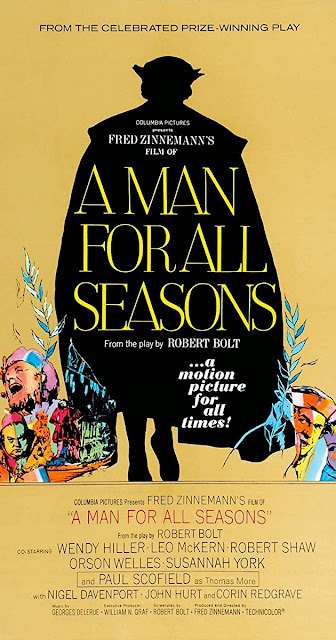I found this 1967 Best Picture winner a stirring film. It is a costume drama set in 16th century England that is very serious indeed. But it is not stuffy even as it is in earnest. It is about something we all aspire to be: a person being true to himself and what he believes. It is inspiring to see a man hold firm to his principles in a world where so many are saying “Why? What does it matter? It’s just a little oath.” But he will not. In this day and age I find it extremely refreshing.
We see our main subject, Sir Thomas Moore, at the start of the film receiving a royal notice from among the highest of offices in the country. The cardinal of England sends a message which we follow to Moore's estate. Moore has a vibrant household, his own court, a loving wife and doting daughter, a great house and servants. He is a man of means and influence and is also a man of great faith. He gathers his wife and daughter for prayer before he heeds the call to the cardinal to discuss the future of England.
There is a supplicating young man, Sir Rich, anxious to serve in his court but Moore sees him as too eager and offers him the advice to become a teacher instead. He warns him to turn away from the pursuit of money, notoriety, and influence. Rich (aptly named) is confused at this advice. Later when confronted with the choice to work for Moore's rival, a corrupt clerk of the church, he almost follows this advice. but bitterness gets the best of him, and the attraction of power and money. Rich threatens his lack of loyalty. Moore knew this all along and turns him away despite the threat.
The setup is this: King Hentry VIII is married to Catherine, his brother's widow, who is barren and therefore there is no heir to the dynasty. Henry is having an affair with Anne Bolyn and wants to divorce his wife to marry her, which is against the teachings of the church. Having already gotten special dispensation from the pope to marry Catherine, Henry needs someone like Thomas, a trusted and faithful believer, to stand on his side in seeking the divorce. Moore, always careful never to declare any statement against the king and the proposition, will not provide his support, even when the king names him Chancellor to England specifically for that purpose.
Moore is one of those guys that you say you want when you would prefer a leader who doesn’t want to lead. He warns against power, bribery, and corruption. He is careful with is tongue, always speaking facts and letting others come to their own conclusions. He is loved and trusted. He is the one man the king seeks approval from and the one man in the country who will not give it. Even when an oath is required to support King Henry as head of the new Church of England, at risk of being named a traitor.
Visually, the film puts Thomas Moore and his old friend Rich on inverse paths. As Thomas's position is lessened which each new appeal that he acquiesce, his home becomes threadbare, servantless, and then he winds up in prison, each cell getting more dark and dank. And he is anxious for his family, but at peace with himself. On the contrary, each time we see Rich he has a nicer coat and a bit more power, and is always looking nervously over his shoulder for the next command from the clerk to find something to sully Moore's name to the public.
The great climax is just like Peter testifying before Rome when Moore is brought before a trial at the highest court of the land. He performs admirably - he was trained as a lawyer, after all - defending himself against the baseless accusations. He declares that Truth is not changed by the vote of the people or the decree of a king. Rich is brought in and we see the contrast between two men - one who held his word and his faith as a part himself, and the other that let it go at every offer.

No comments:
Post a Comment